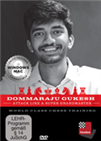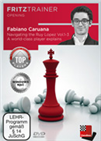Heart-Pounding Moves
Insights into Players’ Heart Rates at the Weissenhaus Tournament!
When I watched the captivating day one video of the Weissenhaus Freestyle Chess event, one detail stood out: Polar, renowned for its high-quality heart rate monitors, was a sponsor! My anticipation grew as I expected to witness heart rate data during the broadcast. However, my excitement waned when I discovered that the rapid event lacked heart rate information. But then the classical event delivered! For the first time, heart rate was being measured in classical chess with slower time controls. Interestingly, I’ve always wondered whether in bullet/blitz formats, where intuition prevails, heart rates remain relatively low compared to slower time controls like Rapid or Classical, which allow more contemplation during critical positions.
 In this Fritztrainer: “Attack like a Super GM” with Gukesh we touch upon all aspects of his play, with special emphasis on how you can become a better attacking player.
In this Fritztrainer: “Attack like a Super GM” with Gukesh we touch upon all aspects of his play, with special emphasis on how you can become a better attacking player.Here are my observations on heart rate data shared as part of the Freestyle Chess event broadcast. As you read these, please keep in mind that these are mere hypotheses, and any firm conclusions are challenging due to limited data. All the pictures below are from screengrabs of the Freestyle chess event YouTube channel [cick to enlarge].

In his game against Levon Aronian, Vincent Keymer’s heart rate races to 104 bpm after the first move! Having to think about the initial moves is already getting players outside their comfort zone especially how deeply they understand the consequences of a bad open from traditional chess!

In his game against Gukesh during first tie break game on the Semi-Finals Day 2, Vincent was had a much better position (>+3 by move 28 according to the engine!) but his heart rate was consistently in the 130-150 range (a winning position often gets our hearts racing, which can also have a detrimental effect on our ability to think clearly!) while Gukesh seemed relatively much calmer with his heart rate mostly in the 90’s and managed to draw the game! Gukesh went on to win the 2nd tie break and the match!

Alireza won his first game against Magnus to take the lead in the quarterfinals match – towards the end of the game, in a winning position, his heart rate was consistently above 130 and at times 140+, seeming well above where it was during the early stages of the game (90-100). During the 2nd game, a must-win for Magnus, it was fascinating to observe Magnus’s heart rate remain in the 75-95 range for nearly the whole game, while touching 100 only at the time of Alireza’s resignation!

Magnus also consistently seemed much calmer, yet very alert, throughout his games and especially in winning positions from observing his heart rate during his matches against Alireza, Nodirbek and Fabi! This balance between calmness and alertness is critical for any intellectually demanding competitive sport like chess!
Below are two positions where despite Fabi’s position being much better or even completely winning, he experienced intense stress (his heart rate soared to 155 bpm and 170 bpm, likely well above his baseline), blundering a rook twice! A high heart rate, indicative of high levels of physiological or psychological stress, clearly affects ones thinking!

 The Ruy Lopez is one of the oldest openings which continues to enjoy high popularity from club level to the absolute world top. In this video series, American super GM Fabiano Caruana, talking to IM Oliver Reeh, presents a complete repertoire for White.
The Ruy Lopez is one of the oldest openings which continues to enjoy high popularity from club level to the absolute world top. In this video series, American super GM Fabiano Caruana, talking to IM Oliver Reeh, presents a complete repertoire for White.Levon, had a much stabler heart rate throughout, consistently below 120 – I’ve always known Levon to be a very happy/positive person and hence this ability to recover quickly from stressors!

Coming soon: Checkmate Stress – How Nutrition, Exercise, and Heart Rate Variability Can Help You Win more at Chess!
Let us learn together how to find the best spot for the queen in the early middle�game, how to navigate this piece around the board, how to time the queen attack, how to decide whether to exchange it or not, and much more!
























